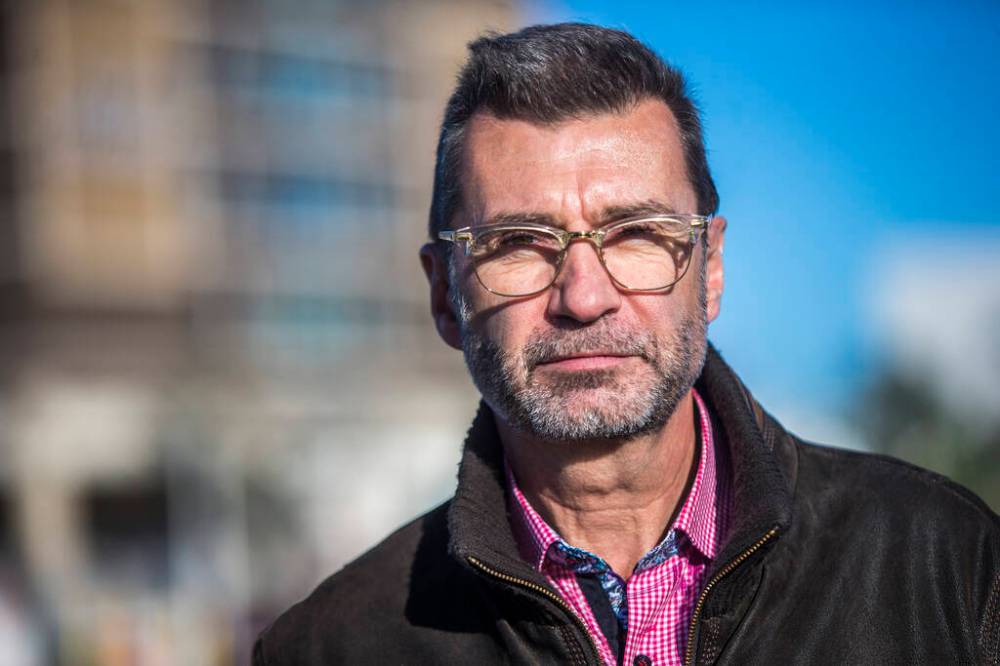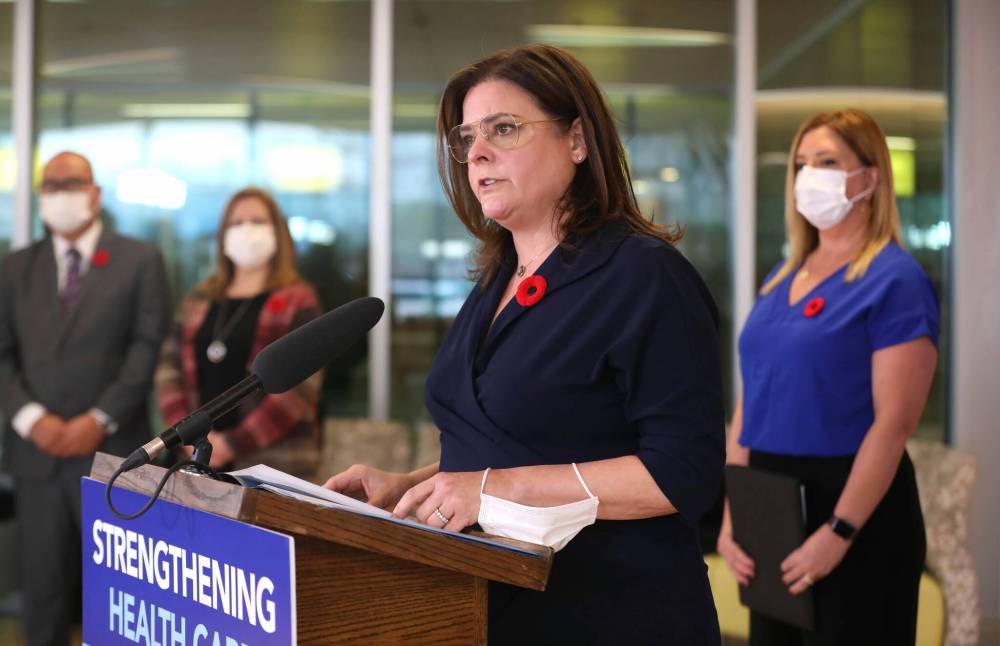Manitoba rejects mask mandate as viruses strain health system
Advertisement
Read this article for free:
or
Already have an account? Log in here »
To continue reading, please subscribe:
Monthly Digital Subscription
$0 for the first 4 weeks*
- Enjoy unlimited reading on winnipegfreepress.com
- Read the E-Edition, our digital replica newspaper
- Access News Break, our award-winning app
- Play interactive puzzles
*No charge for 4 weeks then price increases to the regular rate of $19.00 plus GST every four weeks. Offer available to new and qualified returning subscribers only. Cancel any time.
Monthly Digital Subscription
$4.75/week*
- Enjoy unlimited reading on winnipegfreepress.com
- Read the E-Edition, our digital replica newspaper
- Access News Break, our award-winning app
- Play interactive puzzles
*Billed as $19 plus GST every four weeks. Cancel any time.
To continue reading, please subscribe:
Add Free Press access to your Brandon Sun subscription for only an additional
$1 for the first 4 weeks*
*Your next subscription payment will increase by $1.00 and you will be charged $16.99 plus GST for four weeks. After four weeks, your payment will increase to $23.99 plus GST every four weeks.
Read unlimited articles for free today:
or
Already have an account? Log in here »
Hey there, time traveller!
This article was published 10/11/2022 (1125 days ago), so information in it may no longer be current.
The Manitoba government is resisting calls to reintroduce a mask mandate as a spike in respiratory viruses, especially among children, is expected to worsen and put further strain on the health system.
Some health workers are publicly asking for a mask mandate while the province grapples with an early surge of respiratory syncytial virus (RSV) and influenza amid circulation of COVID-19.
Without mitigation, Dr. Doug Eyolfson, who works in Winnipeg’s Grace Hospital, is concerned Manitoba will soon follow the lead of Ontario, where pediatric intensive care units are beyond maximum capacity.

MIKAELA MACKENZIE / WINNIPEG FREE PRESS Former Liberal MP and ICU doctor Doug Eyolfson believes the province should reinstate its indoor masking policy.
“I think we’re in a very dangerous situation. We have to go back to indoor mask use in public places,” he said. “The current strategy of encouraging people to do that isn’t working.”
On Thursday afternoon, 11 patients were in the pediatric ICU at Children’s Hospital, a Shared Health spokesman said.
The baseline capacity is nine staffed beds.
The unit has “regularly had to expand beyond this capacity since the spring to provide care for critically ill patients, with additional staff scheduled and others reassigned from other parts of the facility to assist in the expanded department,” the spokesman wrote in an email.
Eyolfson, a former Liberal member of Parliament, is critical of the provincial Tory government’s guidance, which leaves it up to “personal preference” for those who don’t have symptoms or are at higher risk of a serious outcome.
“I think we need to start mandating it again,” said Eyolfson, who also wants the vaccine mandate for health-care workers to return.
Eyolfson acknowledged there is pandemic and mandate fatigue in Manitoba, but he believes a lot of people won’t take precautions unless they’re mandated.
Along with public health officials and the province, he is encouraging Manitobans to ensure their COVID-19 and flu shots are up to date.
Premier Heather Stefanson confirmed Thursday the province has no immediate plan to bring back a mask mandate.
All public health orders, including a mask mandate, ended in March.
“For right now, we’re not looking at any mask mandates,” she said at a health funding announcement at Winnipeg’s Women’s Hospital. “I encourage people who are maybe feeling a little under the weather, please protect others.
“Do wear a mask if you’re out and about in public and make sure you’re protecting others, and particularly our health-care workers.”
The advice doesn’t go as far as that of federal public health officials, who said people should stay home if they have symptoms of a respiratory virus.
Dr. Julie Lajoie, a research associate who works in virology and immunology at the University of Manitoba, would welcome a mask mandate for public places such as schools and retail stores.
She said Manitobans should take the same basic precautions as they did at this time last year, when public health orders were in place and illnesses such as COVID-19 and RSV also spiked.
“We’re in the beginning of November, so this (virus) season is just starting,” she warned. “Unfortunately, it’s going to get worse. We’re not at the peak of influenza yet.”
Lajoie said many children have contracted COVID-19 since December 2021.
The possibility that even a mild infection could make their immune systems less able to fight off other viruses must be considered, she said.
The spike in illnesses such as RSV, a highly contagious infection of the lungs’ small airways, has Winnipeg’s Children’s Hospital on pace to set a monthly record for emergency room visits.

RUTH BONNEVILLE / WINNIPEG FREE PRESS
Speaking Thursday during a health funding announcement at Winnipeg’s Women’s Hospital, Premier Heather Stefanson confirmed the province has no immediate plans to bring back a mask mandate.
An average of almost 180 patients per day have gone to the ER so far this month, an increase of about 23 per cent from October and 45 per cent from November 2021.
As a result, Manitoba’s RSV prophylaxis program, which provides antibody treatments to high-risk children, has started a couple of weeks earlier than usual.
The program normally begins later in November.
“It has been a very difficult time as we see that uptick in RSV,” said Health Minister Audrey Gordon, who joined Stefanson at Thursday’s news conference. “That (program) will certainly help.”
Gordon echoed the premier’s call for people to wear a mask if they’re ill.
Dr. Theresa Tam, Canada’s chief public health officer, on Thursday urged people to stay home if they have symptoms of a respiratory virus.
She said people should wear masks in indoor public places and follow other precautions such as hand-washing to reduce the spread of viruses.
“Although no individual layer of protection is perfect, when used consistently and together, vaccines plus layers can provide excellent protection against COVID-19 as well as many other infectious diseases we may encounter,” Tam said at a news conference in Ottawa.
RSV and influenza are above seasonal levels, she noted, and Omicron variants BQ1.1 and BF.7 are emerging.
More than half of recent influenza cases have been in children and teenagers, said Tam.
This fall and winter are unlike the previous two during the pandemic because contact rates have increased, meaning there’s more opportunity for COVID-19 and seasonal viruses to spread by droplets.
Many Canadians are beyond the six-month time lapse since their last COVID-19 vaccine dose or Omicron infection, resulting in declining immunity, said Tam.
Immunity to other respiratory viruses is lower given there has been less circulation of those illnesses in the past two winters, she said.
COVID-19 vaccine uptake has slowed down in Manitoba. Only one in five eligible people has had at least one dose in the last six months, according to government data published Thursday.
chris.kitching@freepress.mb.ca
Twitter: @chriskitching
As a general assignment reporter, Chris covers a little bit of everything for the Free Press.
Our newsroom depends on a growing audience of readers to power our journalism. If you are not a paid reader, please consider becoming a subscriber.
Our newsroom depends on its audience of readers to power our journalism. Thank you for your support.
History
Updated on Thursday, November 10, 2022 5:36 PM CST: Adds comments from Shared Health.


